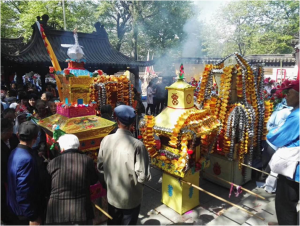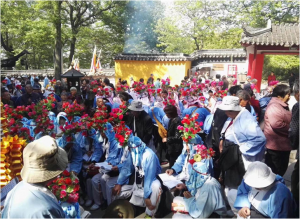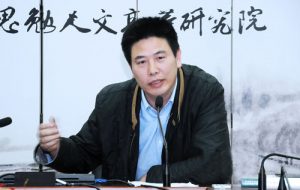The Life-world of Chinese Buddhism: Temple-Town Relationship and Everyday Life in the Area South of the Yangtze River
中国佛教的生活世界:江南寺-镇关系与日常生活


Click here to read the lecture report written by Jing Le.
When: 3:30 pm Wednesday, November 21, 2018
Venue: Asian Library Room 506
Sponsor: Tianzhu Buddhist Network, with support from FROGBEAR

Abstract: Nobody, not even religious believers, could bear to live in a world constructed from religious symbols. Thus, we can neither avoid nor neglect the close relationship between religious belief and daily life. After Buddhism was introduced to China, its thoughts and systems have undergone deep Sinicization, with Chinese characteristics imbued in Buddhism ever since it entered daily life. In the area south of China’s Yangtze River, monasteries are closely linked with the districts in which they are located. On one hand, it is common to see the connection between temples and towns. Such as towns developed around temples and towns named after temples, which has generated a market for temple incense. On the other hand, Buddhist culture has combined with local folklore and regional narration in order to construct a unique public living space to the south of the Yangtze river with a strong “sense of place”. Consequently, Buddhist culture has become an important component of festival celebrations, weddings and funerals in everyday life. The Temple-Town relationship is an epitome of the life-world of Chinese Buddhism, through which the substantial contents of Chinese Buddhism which relate to daily life, folklore and rites are visible.
About the speaker:
 Prof. Tang Zhongmao is currently a professor and doctoral supervisor of School of Social Development at East China Normal University, he is also serving as the copy editor of Journal of East China Normal University (Philosophy and Social Science) and the deputy director of Center for Social and Religious Research of East China Normal University. He received his doctorate in philosophy at East China Normal University and finished Postdoctoral study in Institute of Chinese Historical Geography of Fudan University. His main research areas are Buddhism, Religious Folklore, and Sociology of Religion. Prof. Tang associates himself widely with academic institutions, serving as the council member of Chinese Association for Religious Studies, the council member and vice-secretary of Shanghai Association of Religion Studies, and the vice-chairman of Shanghai Zhao Puchu Research Institute. He has published 5 monographs and more than 40 academic papers including Fojiao benjue sixiang lunzheng de xiandaihua kaocha (Debate on Buddhism Original Enlightenment Thought in Modernity, 2006), Zhongguo of jiao jindai zhuanxing de shehui zhi wei 中國佛教近代轉型的社會之維 (The Social Dimension of Chinese Buddhism’s Transformation in Modern Times, 2013), and Jingjuan yicun: Changjiang liyu minsu wenhua yu yishu yicun 經卷遺存:長江流域民俗文化與藝術遺存 (The Remaining Scriptures: The Folk Culture and Art Remaining in Yangtze River Basin, 2013). 唐忠毛教授現任上海華東師範大學社會發展學院教授、博士生導師,《華東師範大學學報》(哲社版)編審,華東師範大學宗教與社會研究中心副主任。先後畢業於南京大學哲學系宗教學專業(碩士學位)、華東師範大學哲學系中國哲學專業(博士學位)、復旦大學歷史地理研究所(博士後)。主要從事佛教學、信仰民俗學、宗教社會學研究。學術兼職有中國宗教學會理事、上海市宗教學會理事兼副秘書長,上海市趙樸初研究會副會長。先後出版專著5本,發表學術論文40余篇,代表作有《佛教本覺思想論爭的現代性考察》(上海古籍出版社,2006年),《中國佛教近代轉型的社會之維》(廣西師範大學出版社,2013年),《經卷遺存:長江流域民俗文化與藝術遺存》(湖南大學出版社,2013年)等。
Prof. Tang Zhongmao is currently a professor and doctoral supervisor of School of Social Development at East China Normal University, he is also serving as the copy editor of Journal of East China Normal University (Philosophy and Social Science) and the deputy director of Center for Social and Religious Research of East China Normal University. He received his doctorate in philosophy at East China Normal University and finished Postdoctoral study in Institute of Chinese Historical Geography of Fudan University. His main research areas are Buddhism, Religious Folklore, and Sociology of Religion. Prof. Tang associates himself widely with academic institutions, serving as the council member of Chinese Association for Religious Studies, the council member and vice-secretary of Shanghai Association of Religion Studies, and the vice-chairman of Shanghai Zhao Puchu Research Institute. He has published 5 monographs and more than 40 academic papers including Fojiao benjue sixiang lunzheng de xiandaihua kaocha (Debate on Buddhism Original Enlightenment Thought in Modernity, 2006), Zhongguo of jiao jindai zhuanxing de shehui zhi wei 中國佛教近代轉型的社會之維 (The Social Dimension of Chinese Buddhism’s Transformation in Modern Times, 2013), and Jingjuan yicun: Changjiang liyu minsu wenhua yu yishu yicun 經卷遺存:長江流域民俗文化與藝術遺存 (The Remaining Scriptures: The Folk Culture and Art Remaining in Yangtze River Basin, 2013). 唐忠毛教授現任上海華東師範大學社會發展學院教授、博士生導師,《華東師範大學學報》(哲社版)編審,華東師範大學宗教與社會研究中心副主任。先後畢業於南京大學哲學系宗教學專業(碩士學位)、華東師範大學哲學系中國哲學專業(博士學位)、復旦大學歷史地理研究所(博士後)。主要從事佛教學、信仰民俗學、宗教社會學研究。學術兼職有中國宗教學會理事、上海市宗教學會理事兼副秘書長,上海市趙樸初研究會副會長。先後出版專著5本,發表學術論文40余篇,代表作有《佛教本覺思想論爭的現代性考察》(上海古籍出版社,2006年),《中國佛教近代轉型的社會之維》(廣西師範大學出版社,2013年),《經卷遺存:長江流域民俗文化與藝術遺存》(湖南大學出版社,2013年)等。









